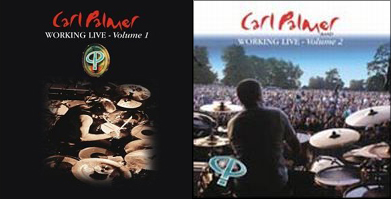What I love above Carl Palmer’s recent releases is that he seems to be stretching himself not only as a player but as an arranger in what he’s doing with his three-piece, the Carl Palmer Band. On both Working Live Volume 1 and Working Live Volume 2, the ELP and Asia skins man shows off his chops and picks the perfect tunes from his past that also showcase the talents of guitarist Shaun Baxter and bassist Davie Marks.
Starting really heavy, mainly due to the blistering riffery of Baxter, Volume 1 opens with “Barbarian,” the opener on Emerson, Lake and Palmer’s self-titled debut. Though it is heavy and Palmer is in full form, it never really gets off the ground – something missing and it might just be that the guitar can’t replace the sustain of Keith Emerson’s keyboards. “Enemy God” and “L.A. Nights” follow (both from the Palmer side of the ELP 1977 double-LP set, Works Volume 1), each faring better with the band. “Tank” is pretty much spot-on, the first song where the trio really gels. “Bullfrog,” of all tunes (a fave from the often overlooked Works Volume 2), is spectacular, showcasing the band and retaining the original riff and all that near-end staccato stuff, but also going off into territories uncharted where Palmer once again lets Baxter wail and Marks pop.
Baxter cuts through with the scary opening to “Toccato,” while Palmer finds woodblocks and toms to hit. Baxter matches Emerson nearly note-for-note and Marks complements Palmer steadily. The much-loathed ELP album Love Beach is represented in a version of “Canario” that mainly features Baxter. A truly inspired Palmer drum solo ends the CD. If anything, he is getting more creative with his solos as time goes on as this one is all feet and snare, truly blistering stuff.
Working Live Volume 2 has a little more sonic variety, though fewer songs than the first volume. There’s the quintessential opener, “Hoedown” (Palmer via ELP via Aaron Copeland). The trio attempts “Trilogy,” and Baxter and Mark’s read on Emerson and Lake’s parts come off inspired, if anything. For his part, Palmer lays back. “Tarkus” sees the trio hitting on all the aggression of the original, especially in the opening part. To make it more captivating, Palmer comes up with wholly different drum approaches to add to his signature snare smacks and tom rolls.
There’s a weird take on Orff’s “Carmina Burana” with Marks’ bass leading the way, then chording through the middle part with a jazzy sound. The real treat here is a tune called “J Section,” too short to get going, but it does represent a real jazz fusion moment from the trio , with the little glimpses I love of Palmer’s playing and writing beyond his colorful history.
The trio more or less solos all over “Fanfare For the Common Man,” with a real chunky bass/drum middle part, then a Palmer solo wholly different than the famed ELP version of this Copeland classic. It’s speedy and sees Palmer’s signature snare blistering. Still playing hard, obviously doing so with a trio that understand and can keep up with him, Carl Palmer and his band are in fine form on both Working Live Volume 1 and Working Live Volume 2.




















